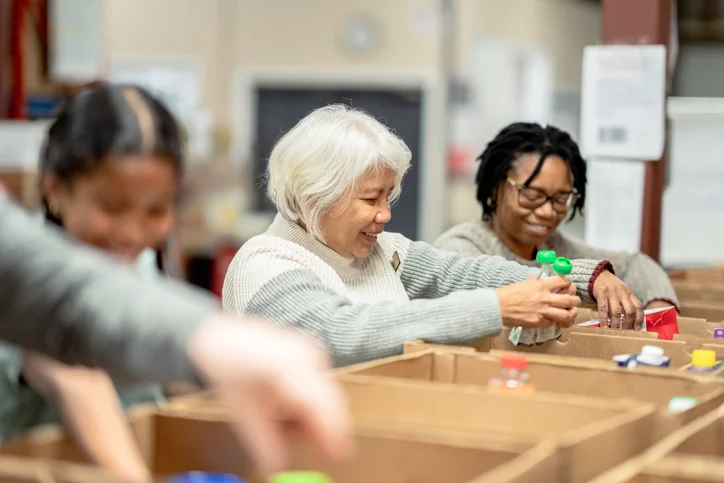This article is part three of a three-part series on Altruism that explores knowing God’s intention for us, how to model Christlike behavior, and how to act in altruistic relationships through the work of the Holy Spirit.
We learned in parts 1 & 2 of the Altruism series that living requires us to know God’s intention for humanity and learn how to model Christlike behavior. In this final part, we will learn how to experience and act in altruistic relationships through the work of the Holy Spirit.
In the Emotional Intelligence in Christ method, we believe situations involve an Encounter, Identified behavior, and Course Correction guided by the Holy Spirit. It is also important to know that an Encounter is not just any encounter but a God-ordained, predestined encounter that is intentional and designed. They happen anywhere, anytime, and with anyone and don’t occur accidentally.
Encounters and relationships are brought into our lives on purpose; therefore, they behoove us to pay attention to them and be intentional in recognizing and responding to them.
So, how do we act in altruistic relationships through the work of the Holy Spirit?
1: We must understand relationships and what they mean as a Child of God
A relationship is how two or more people are connected or behave toward each other. People engage in many different types of relationships that have unique characteristics. Relationships can be platonic, romantic, codependent, or casual, but each involves an encounter resulting in some reaction. It is essential to know that every relationship represents a leap of faith due to the type of interpersonal association, connection, or interaction between two or more people. With each relationship we encounter, we must know how the Holy Spirit would have us respond to it. In part 1 of the series, we discussed how God showed us his intention for us when we were created.
“Dear friend, I pray that you may enjoy good health and that all may go well with you, even as your soul is getting along well” (3 John 1:2)
God’s intention for us is to be of good health. The Holy Spirit ensures this through God’s design of us as human beings. Many research studies suggest that individuals in stable, long-lasting relationships typically live longer than single individuals across demographic groups. And that evidence suggests that increased intimacy and emotional connections lower depression symptoms, as well as enhance immune function and cardiovascular health. We are designed for relationship encounters but must rely on the Holy Spirit on how to handle our behaviors and emotions in all situations.
2: We must know that relationships require us to support each other, altruistically
Beyond understanding relationships, we must learn to help and support others. Galatians 6:2 says, “Carry each other’s burdens, and in this way, you will fulfill the law of Christ.” This act of Altruism is further exampled in Hebrews 6:10, where it tells us that “God is not unjust; he will not forget your work and the love you have shown him as you have helped his people and continue to help them.”
We are introduced daily to encounters, behaviors, and the need to correct the course. The EIC model suggests situations don’t just happen in relationship encounters we know but also in those that require us to give. There could be a situation where you pass someone homeless, and others with you may say, don’t look, but the Holy Spirit tells you something entirely different. Or when you have a colleague who others have written off, but you somehow feel the urge and need to support them. God at that time may be using you an example of modeling Christ-like behavior in these situations. Matthew 5:16 tells us, “Let your light shine before men, that they may see your good works, and glorify your Father which is in heaven.” This scripture could be the very reminder of how you can empower others to do as the Holy Spirit would have you do rather than acting in the flesh.
3: We must do all things through the discernment and activation of the Holy Spirit, but we have to know who the Holy Spirit is.
The Holy Spirit is God’s power in action, His active force. God sends His Spirit by protecting, empowering, and guiding us to accomplish his will. The Holy Spirit makes us know the presence of Jesus, makes us more like Jesus, and helps us understand His word. The action in the Holy Spirit calls people to faith in Jesus Christ and calls us to a specific vocation or task. This activation of the Holy Spirit means that the God of the universe will guide us in our vocational decisions. We should find peace in knowing that our God is directing our steps and guiding our lives—even regarding our work, leadership, and personal lives.
Our uniqueness is essential, and so is what we are called to do in our charitable giving. In Acts 13, the Holy Spirit asked for Barnabas and Saul to be set apart “for the work to which [he] called them.” Altruistic giving is unique for each of us, based on our spiritual gifts and what God has for us to do.
4: Lastly, God doesn’t give us these gifts for our benefit but for the common good of the church
1 Cor. 12:7 says, “A spiritual gift is given to each of us so we can help each other.” Everyone is given something to do that shows who God is and what he wants us to do for the common good. As referenced in 1 Pet. 4:10, “You should use whatever gift you have received to serve others as faithful stewards of God’s grace in various forms. This scripture tells us that the Holy Spirit guides us in how we give to all kinds of people in all forms. It isn’t a cookie-cutter approach but an approach with individualized differences.
The takeaway in this series is that we must know God’s intention for humanity, learn how to model Christlike behavior and experience how to act in selfless relationships through the work of the Holy Spirit. This behavior modification takes the application of spiritual tools like the EIC Model but, more importantly, letting the Word of God be a priority in our life through regular feeding, meditation on His word to know what He wants for us daily, and activating His Holy Spirit so we become doers of the word.
This new knowledge should help us use our spiritual gifts to build up the church, serve others, and make the Word of God the final authority in our lives.
Explore your abilities to lead like Jesus through our Lead Like Jesus Revisited 6-Week Study Guide.










